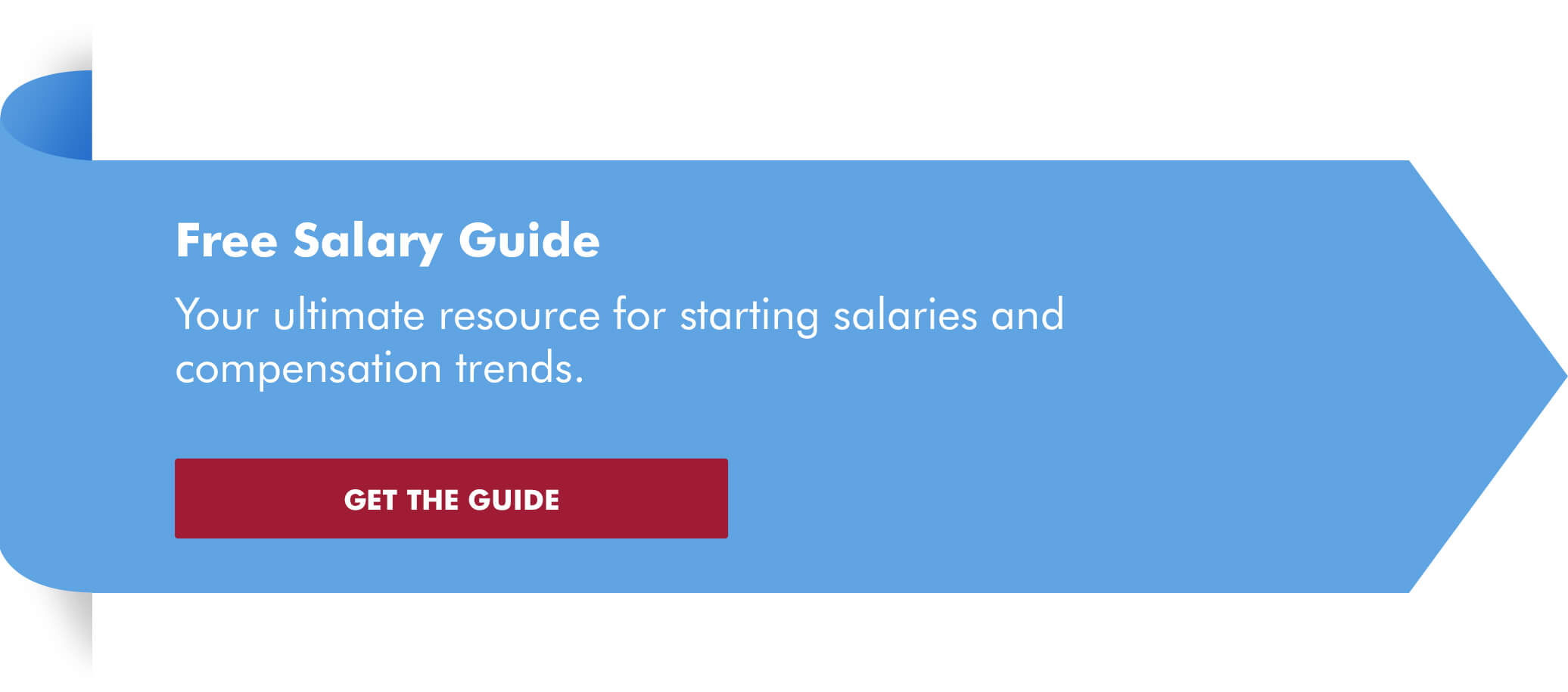By Ai Ling Lee, Vice President, Finance and Accounting Permanent Placement, and Ryan McCarty, Branch Director, Robert Half
Change is constant in today’s finance and accounting profession — and in the business world. That has many professionals in the field wondering how to take advantage of evolving dynamics to advance their careers or even take it in an entirely new direction. They also want to know how to stay relevant.
We explored all of the above in-depth in a recent webinar for Institute of Management Accountants (IMA), moderated by Terry Mormile, CPA, CAE, and director of international education and career services at IMA. We discussed:
- Trends in the labor market, including how the unemployment rate for college-degreed workers and many accounting and finance roles is tracking well below the national average, according to data from the Bureau of Labor Statistics.
- The “Great Remorse” — a term used to describe the feelings of regret that many workers are experiencing after hastily quitting their jobs and jumping into new ones as part of the Great Resignation. (See these tips from Paul McDonald, senior executive director at Robert Half, on how to start a new job with less risk of feeling remorse.)
- Building soft skills that can help finance and accounting professionals stay relevant in the modern workplace, where they may need to work remotely, or interact with colleagues working remotely, all or part of the time. Communication skills and adaptability are critical, for example.
We also covered the value of self-branding online, particularly on the professional networking site LinkedIn. We took several questions from our audience members on this topic and others. However, due to time constraints, we weren’t able to address all the questions submitted. So, we thought we’d use this post to continue our discussion, starting with two questions about self-branding online.
What are some quick tips for self-branding online?
If you want to create and maintain a standout professional image online, you’ll need to invest time and effort — that’s a given. But there are many simple things you can do to strengthen your LinkedIn profile and get noticed. Some quick tips include:
- Using a high-quality and recent photo on your profile.
- Updating your experience and credentials.
- Connecting with people you know and others in the same industry.
- Sharing relevant articles written by someone at your company or in your industry, or that align with your work interests and values.
Also, if you have active, public profiles on other platforms like Facebook, Twitter and Instagram, make sure what you post on every channel is in line with the professional image you want to project to the world.
For additional tips on building a LinkedIn profile that can benefit your career, check out this post from Brandi Britton, executive director, contract and permanent placement, at Robert Half.
What hashtags are appropriate to use on LinkedIn?
Hashtags (metadata tags preceded by the hash “#” symbol) on LinkedIn and other social media sites can help you connect with people in your industry or professionals with similar interests. There are countless options to choose — including #PersonalBranding!
You can find hashtags in your LinkedIn feed. Say you see a hashtag that interests you in a post from one of your contacts, like #accounting. Click on it to see what content is associated with it. If it interests you, click the “follow” button. You can also use the search function on LinkedIn to find more hashtags you may want to follow or add to your own posts; just make sure they’re relevant and, ideally, trending.
Another tip: Consider using the open-to-work feature on LinkedIn to let recruiters and your contacts on the site know that you’re open to new job opportunities. You also can also control who can see whether you are open to work. Learn more about how to use this feature on LinkedIn.
Next up, we’ll address a question we received about one aspect of company culture: team culture.
How can I discover what the team culture is like before I join an organization?
The interview process is an opportunity to learn about the team culture. Be forthright in asking those you would be working for or with to describe the team culture. What do they like about it? Does what they tell you align with your vision of a work environment you would thrive in?
You might also want to describe what type of team culture you’re seeking as a way to prompt a discussion with interviewers about this topic. Also, if you’ll be joining a remote or hybrid organization, ask what team members do to stay connected and how leadership helps ensure everyone feels included.
Another strategy is to seek out people in your professional network who might have firsthand knowledge (or know someone who does) of how a particular business unit or department at your target employer operates. Company review sites can also offer insight. Just keep in mind that some reviews may be from disgruntled employees and may not offer an accurate picture of the team or company culture.
Need more tips on how to evaluate a company’s culture as a job seeker? Read this post.
And finally, here are quick answers to three additional questions we received during our recent webinar:
How can I avoid burnout?
In a recent Robert Half survey, 41% of U.S. workers said they are more burned out now than they were a year ago. How can you keep burnout at bay? These tips can help:
- Set boundaries. Whether your work arrangement is in-office, remote or hybrid, fine-tune your schedule to achieve the right work-life balance.
- Reassess your role. Talk to your manager about how you might change your responsibilities or contribute to different projects or teams so you can stay motivated and engaged at work.
- Be realistic. Don’t take on too much at one time, and make sure you have all the resources and information you need to do your job well.
- Prioritize wellness. Take advantage of the perks and benefits your business provides that are designed to help support employee health and well-being.
How can I demonstrate to my boss that I’m serious about advancement?
Be open with your boss about your aspirations, and work with them to create a career map that can help you progress toward your goals at the company. Ask for your manager’s advice on how you can advance. Some steps they’re likely to recommend are continuing education courses, skills training, job shadowing and mentoring arrangements.
Earning in-demand certifications, like the CMA, can also help you advance in your finance and accounting career. “The CMA demonstrates expertise in financial accounting and strategic management,” explains IMA’s Terry Mormile. “It can open the door to leadership opportunities in the field and a higher level of compensation. It also benefits your career to be a lifelong learner and show employers that you’re constantly striving to improve your knowledge and skills in a changing world.”
Learn more about the accounting certifications today’s employers want to see in this post.
How can I find a job in a different industry?
The good news is that finance and accounting roles are needed in every major industry. Among the positions in high demand today, according to Robert Half’s Demand for Skilled Talent report, are financial analysts, accounts receivable (AR)/accounts payable (AP) specialists, bookkeepers, and accountants and auditors — to name a few.
If you have a solid array of technical skills and soft skills, you’ll have an edge in today’s competitive labor market. But you may need to compensate for a lack of specialized knowledge about your target industry. Here are some ways to overcome that hurdle:
- Before starting your job search, make a point to learn more about the industry and try to network with people who work in it.
- When applying for jobs, focus on your transferrable skill sets, and think about how you can add value to a company because you have a different industry perspective.
- Look for employers that indicate they’re willing to provide training and are focused on hiring high-potential professionals.
Finally, consider pursuing contract work as a way to gain experience in different industries before committing to one for the long term. To get insight into this option, talk to the recruiters at Robert Half.
About IMA® (Institute of Management Accountants)
IMA® is one of the largest and most respected associations focused exclusively on advancing the management accounting profession. Globally, IMA supports the profession through research, the CMA® (Certified Management Accountant) and CSCA® (Certified in Strategy and Competitive Analysis) programs, continuing education, networking, and advocacy of the highest ethical business practices. Twice named Professional Body of the Year by The Accountant/International Accounting Bulletin, IMA has a global network of about 140,000 members in 150 countries and 350 professional and student chapters. Headquartered in Montvale, N.J., USA, IMA provides localized services through its four global regions: The Americas, Asia/Pacific, Europe and Middle East/India. For more information about IMA, please visit www.imanet.org.
Also, if you’re interested in the management accounting path, consider signing up for a free three-month trial membership with IMA®.
About the authors
Ai Ling Lee has over 10 years of recruiting experience within finance, accounting and financial services across various international cities including San Francisco, Boston, and Shanghai, China. In her current role as Vice President, Ai Ling supports Robert Half’s finance and accounting permanent placement practice group for North America, implementing operational best practices, coaching and development and technology adoption with the goal of increasing revenue and retaining talent. Prior to Robert Half, she worked for ANZ, an Australian multinational bank in credit risk analysis and relationship management for medium to large businesses.
Follow Ai Ling Lee on LinkedIn.
For over 10 years, Ryan McCarty has been a noteworthy leader in the accounting and finance consulting space. Driven by helping companies and consultants with special projects and strategic initiatives, he takes pride in providing solutions to improve efficiencies and increase productivity. As a branch manager, his goal is growing people and growing revenue. In addition to his primary job functions, Ryan has been recognized as a top performer at Robert Half for his extraordinary commitment to leadership and development. He holds a BA in Accounting from Miami University and currently resides in Cincinnati, Ohio. Prior to Robert Half, Ryan spent six years at Cintas in their accounting, finance & corporate development departments.
Follow Ryan McCarty on LinkedIn.








